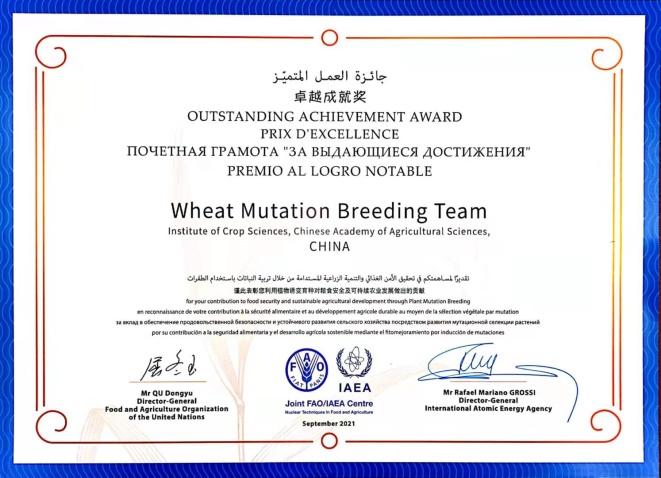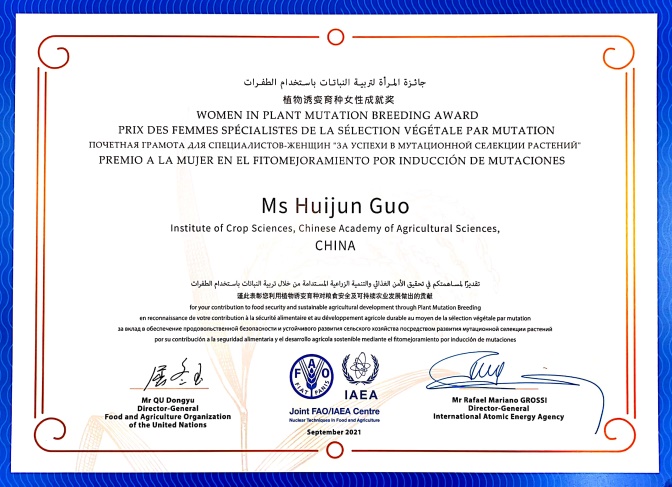ICS Honored with Two International Awards on Plant Mutation Breeding
Date:2021-12-24Author:Luxiang LiuSource:
Two awards were honored to the research team and researcherfrom the Institute of Crops Sciences (ICS), Chinese Academy of Agricultural Sciences (CAAS) on their contributions to plant mutation breeding at the 65th General Conference of International Atomic Energy Agency (IAEA) on September 20th, 2021.The Wheat Mutation Breeding Team (hereinafter referred to as Team) was granted Outstanding Achievement Award, and one of the team members, Dr. Huijun Guo, was awarded Women in Plant Mutation Breeding Award. The awards wererecognized by the Food and Agriculture Organization of the United Nations (FAO) and IAEA. Prizes were presented by the Director General of the IAEA, Rafael Mariano Grossi and the Director General of FAO, Qu Dongyu during the ceremony which was hold in Vienna. Ambassador of Chinese Envoy to the UN in Vienna, Wang Qun,was invited to attend the ceremony and delivered remarks.


Mutation breeding is one of the effective ways in improving crop breeding. With the mitigation efforts and strong supportunder coordination of the China Atomic Energy Agency (CAEA), the team has been coordinating IAEA Technical Cooperation projects in the Asia Pacific region, which has been the leading country coordinator for nearly 20 years. The team has organized 20 member states to implement mutation breeding on crops, and has fostered young scientists for the quality workforce in developing countries. The Asia and Oceania Association of Plant Mutagenesis (AOAPM) was founded to jointly promote the development of mutation induction technology. In cooperation with the Joint FAO/IAEA Centre, it co-sponsored and hosted the First Workshop on Plant Mutation Breeding Network (MBN) for Asia Pacific, a “Jingzhou Proposal” was formed at the meeting. The Team has provided mutation induction treatments on a variety of crops for researchers across the Asia Pacific region, Africa and Eastern Europe, which promoted the application and "going out" of nuclear technology from China, has contributed to global food security and eradication of hunger.
Professor Luxiang Liu, the Principal Investigator of the Team, said that they have long been engaged in technical innovation of mutation induction, development of new elite mutant germplasm and varieties in wheat. In the past ten years, more than 10 new wheat mutant varieties have been officially released including Hangmai 247, Hangmai 287, Hangmai 501, Hangmai 2566, Hangmai 3290 and Luyuan 502. Among them, Luyuan 502, bred in cooperation with the Atomic Energy Institute of Shandong Academy of Agricultural Sciences, solved the practical problem of heavy lodging encountered during the cultivation of wheat varieties with heavy spikes. With a yield potential of more than 12 t/ha, it has been planted on more than 5.3 million hectares by 2020. It has been awarded the Second Award of National Science and Technology Progress in 2019.
The team is formerly known as the Plant Mutation Breeding and Genetics Laboratory of the Institute for Application of Atomic Energy, CAAS, which was established in 1957, who aims atproviding technology and methodology support for crop improvement and food security through mutation induction. The team was titled National Center of Space Mutagenesis for Crop Improvement in 2003, IAEA CollaboratingCenter for Nuclear Techniques in Plant Mutation Breedingin 2019 and CAEA Center of Excellence on Nuclear Technology Applications for Irradiation Mutation Breeding in 2020.
